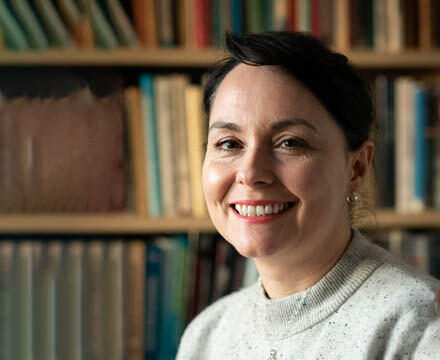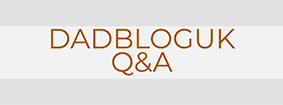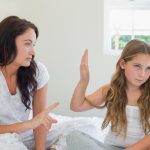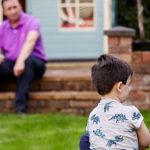I’m sure we all known individuals who are parenting with anxiety. I can think of numerous people who are living with anxiety while also raising children, some with a diagnosed condition, others who haven’t sought help. What was once called “nerves” and swept under the carpet is spoken about more freely and a greater range of help and support is available. This includes a a new, online course developed by a team from the University of Sussex and dads and mums are encouraged to participate (particular emphasis on dads. Why? Well read on!).

The course has been developed by a team led by Professor Sam Cartwright-Hatton, a clinical psychologist with a particular interest in how mental health conditions impact on families. The course is designed to help parents and carers who sometimes struggle with raising children because of their anxious feelings. It was originally run via a series of face-to-face meetings but to reach a larger audience, an online version of the course was developed .
The course forms part of an ongoing study into parenting with anxiety. Mums and dads are needed to volunteer and complete the course and as Prof. Cartwright-Hatton explains in the Q&A below, there’s a recognition this area of research isn’t always inclusive of fathers. As a result, there’s a real desire to get mums and dads to complete the Parenting with Anxiety course.
I was granted access to the course. While I can’t claim to be an expert, I do see real value in it and I can see it behind of huge value to individuals who struggle with anxiety. I encourage you to have a read and to undertake the course yourself (links are embedded in the text below so you can find out more).
What is the background to the Parenting With Anxiety course?
We know that anxiety can really run in families. It doesn’t always: Anxious parents can have really confident children and vice versa. But we know that having an anxious parent does increase the odds that a child will be anxious too. Nobody who has experienced an anxiety problem ever wants their children to suffer in the same way as them, but up until now, there’s been nothing for these parents, no support to help raise confident children when you yourself are anxious. So we started offering a workshop for parents who had anxiety disorders. It was a one day workshop (or two mornings) designed by clinical psychologists who were experts in treating anxiety disorders in children. The idea was to give parents high-level skills in dealing with their children when they were anxious, and also some tips on preventing that anxiety arising in the first place. The workshops have been very popular. Parents have loved them. And what is more, they seem to work. We got some funding from the National Institute for Health Research to test the workshops out, and found that a year after their parents came on a workshop, children were 16% less likely to have an anxiety disorder, compared to children whose parents didn’t do the course.
Who is the course for and why place it online?
The problem we now had was getting our course to all of the parents who wanted it. After the first research study finished, the courses were only running in Brighton, which is somewhat inconvenient to get to. Even local parents sometimes found it difficult to get time off work, or get childcare so that they could come along. We realised that if we wanted the course to reach everyone who could benefit from it, we were going to have to put it online. So, we now have a fully online version of the course. Parents in our new research study can do it whenever they want, and wherever they want. We have been lucky to get more funding from the Kavli Trust to see if this online version works, and are looking for around 2000 families to help us. We are looking for dads and mums or anyone who has responsibility for a child aged 2-11, to take part. The only thing we ask is that these parents experience significant anxiety in their life and can commit the time necessary to complete the study. More info is available by following this link.
Just a general question to set the scene, how big an issue is anxiety is in general society and do you think the pandemic has made it a bigger issue?
Anxiety disorders are really, really common. Some people think it’s the most common psychological problem. There has been quite a lot of research on whether the pandemic has made this worse, but… the jury is still out. Some studies seem to show increases in anxiety, whilst others show no change, or even drops in anxiety. It looks like it will have varied from person to person. There is some evidence that parents of young children have had a particularly rough time. The challenge of trying to juggle home-schooling and working from home has been very stressful. However, other people have really benefited from not having a long commute every day, or from being away from a stressful work environment. It will be interesting to see how it all unfolds over the next few years. I am optimistic that most people who experienced a strain to their mental health will bounce back. And, fingers crossed, we will have learned a lot from the pandemic, including that it is OK to work from home and to work flexibly, which can only be a good thing for most families. That said, some people with specific sorts of anxiety such as social anxiety and OCD may find that it is a real challenge to get back to doing the things they used to do and I hope that support will be available for them.
I understand that you’re very keen to encourage men and dads to take part in the study. Why is that?
Dads are so important but so neglected in the research! Most studies of child and family mental health ignore dads, and we did not want to make that mistake. Also, from running lots of our face-to-face courses, I could see how well dads did,but also how they sometimes seemed to really connect with different bits of the course to mums. We want to try to understand this. It’s possible that there are skills and bits of knowledge that are more useful for dads than mum and vice versa, and if we know that, then we can tailor our courses better in future.
I’ve had a good look at the course and can see it has quizzes, animations, videos and so on. What would you say parents should expect when completing the course?
We’ve tried to make the course as fun and easy to complete as possible. There are eight modules to complete, each of which takes between 20 and 30 minutes. Each module is made up of animations, snippets of info, quizzes, and short videos, and throughout the course you will follow the progress of five (fictional) parents who experience anxiety and who have gone through our course. Each module will give you things to go away and try with your kids and we suggest that you leave a week or so between modules to give yourself time to try these.
The course also involves a certain amount of reflection on your own past using a panel of parents discussing their own childhoods. What is the thinking of getting people to be reflective in this way?
We want parents to know that they are not alone. When parents come along to our face-to-face courses, they are with a group of other parents who have struggles with anxiety and I think that helps it to feel less lonely, and to feel really supportive. Also, some of our best ideas have come from parents on our courses! We didn’t want to lose that when we put the course online. We have what we call our ‘parent panel’. It is made up of five parents, from all walks of life, who experience a range of different anxiety problems, who progress through the course alongside you. To be clear, these are ‘fictionalised’ characters. We are super-careful about parents’ privacy, so we did not think it was right to use real parents. Instead, each of our parent panel is a composite of many parents that we have worked with. The things they say are things that real parents have said to us, but with some small details changed to protect confidentiality. Sometimes these characters talk about their own childhoods. This happens a lot in our face-to-face courses, so it’s clear to us that the info we cover does sometimes make parents think about their own early lives. When it happens in our real-life groups, we are able to respond to that and help parents to make sense of the parenting they received, to work out which bits of it they want to pass on to their own children, and which bits they don’t. But when it’s online we can’t do that. We wanted to cover some of the most common things that come up, so we integrated that into our parent panel.
You’ve mentioned the panel and that they sometimes reflect a lot about their own background. Does parenting anxiety often come from our own experiences growing up?
Anxiety can arise for lots of different reasons, but yes, many anxious people we work with report particular experiences growing up. In particular, we often hear a lot about parents who were very overprotective and did not give their children the chance to practice facing life’s little hurdles. We also hear of parents who were very anxious and passed this on by giving their children repeated messages that the world is a dangerous place and that they should always be on their guard for bad things happening. The problem is that our brains are wired up to repeat these parenting styles with our own children! This course gives parents a chance to think about what sort of parenting they want to use with their own children, and whether there are bits of their own early lives they’d rather not repeat down the generations.
If parents take part in your study, will they definitely get access to this new course?
We are trying to find out how well our new online course works and to do this we need some parents who do it and some parents who do not. So, half of parents will get randomly selected to do the course, and the other half won’t do the course. The people who do not do the course are very important to the study: We couldn’t do it without them, and they are providing us with hugely valuable information about why anxiety so often runs in families, and what we can do to stop it.
Where do you suggest mums and dads get further help I they feel they are parenting while daling with anxiety?
Our study is currently open to all anxious parents with a child aged 2-11! Do visit the website to find out more.







